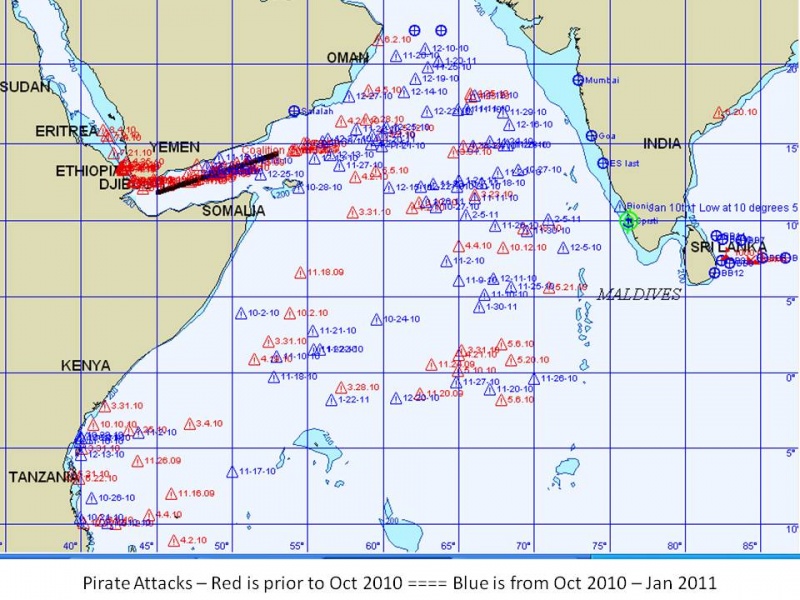FAQ - Do you worry about pirates?
/When we were in the Indian Ocean, David wrote a blog about piracy concerns in the area. Incidents of piracy in the Indian Ocean were all the news, especially after watching Captain Phillips.
We were very aware of potential problems off the Somalian coast. We planned to stay offshore well south of the questionable area. We were not particularly worried, nor did we have any problems, but we were certainly cognizant of the issues and aware of the four Americans aboard the yacht Quest who were pirated and murdered in 2011. When we were heading from the Guianas back into the Caribbean Sea, the questions were posed again. We received several inquiries from friends and readers about piracy in the Caribbean in light of several attacks near Trinidad and the Venezuelan coast, the area in which we would be sailing. This time we were more concerned.

Piracy has been a problem since men started plying the ocean waters. According to Wiki, “the earliest documented instances of piracy were in the 14th century BC” in the Mediterranean and the Aegean Seas. Certainly, Treasure Island and Pirates of the Caribbean has provided lots of piratical entertainment for audiences in a very romanticized way. In truth, however, the pirates who plied the Caribbean waters... and there were many... were known to be excessively barbaric and cruel. In the Golden Age of Piracy (1650-1730), L'Olonnais, Captain Kidd, Blackbeard and countless others wreaked havoc throughout the Caribbean. Some, like Sir Francis Drake and Henry Morgan, were sanctioned by the Crown.

Today's pirates of the Caribbean are not sanctioned by any government, but they are just as real and just as ruthless and bear no resemblance to Johnny Depp.
Statistically, piracy attacks are down worldwide, but that makes little difference to the individual yachts that are attacked. Actually, only larger ships are counted in the statistics and most yacht attacks are downplayed in the interest of local tourism.

Just after our passage from the Guianas to Trinidad in December, two yachts were boarded at gunpoint and robbed by pirates. The coast of Venezuela seems to be a particularly troublesome pirate hotspot at the present time.
So what can cruisers do to protect themselves against pirates?
- Well, larger yachts hire armed security guards. We are not a larger yacht. We do not carry guns aboard. We figure we'd be outgunned anyway.
- Officials say “avoid known pirate areas” (duh!). This makes sense if you're cruising and not passage-making. For sure, anchoring in known pirate areas is inviting problems.
- Since we had no choice but to sail through an area known for piracy, we heeded the local advice. Most pirate attacks in the area have been in open boats with big, fast engines, so outrunning them is not a possibility. Instead, we stayed well offshore away from the Venezuelan coastline and away from the usual travel routes.
- Traveling at night is recommended … on a multi-day passage this is kind of difficult, but if we were sailing between the islands, it's reasonable and would have done it.
- Traveling in company is a recommendation. In our case, there was no one to travel with, so we traveled alone, but there's definitely safety in numbers. Forming a flotilla of boats to make a passage through a high-risk area makes good sense.
- Some advocate “sailing dark” and “sailing silent”, ie no running lights, no radio communication. We did not opt to do this, but we've certainly done it on occasions in the past when sailing off the coast of Colombia into Cartagena.
- Stay alert. I'm not sure what tactics you might employ to thwart a pirate attack, but you'd perhaps have more time to radio for help.
- If you're accosted, don't fight. Your life isn't worth the gear the pirates steal. Easier said than done, perhaps, when you're the one being violated and it's your gear they're walking off with. Still, sage advice to live by.
Though the number of pirate attacks on yachts in the Caribbean seems to be increasing, we sometime wonder if part of the increase is due to the fact that more yachts are filing formal reports. Both the Venezuelan and Trinidadian national coast guards have increased their patrols in the area providing a bit more security, but caution and careful itinerary decisions rule.
We have been boarded while in a marina and while in a boatyard and had things stolen from the boat. Those are security issues, not piracy. The chances of being boarded by pirates, if reasonable common sense is used, are probably pretty slim, something like being car-jacked. Still, I'd say offhand, we're probably lucky. The only pirates we've actually encountered have been tradesmen and vendors who “saw us coming” in boatyards and a few friendly buccaneers in Charleston, South Carolina who politely reserved a boarding time in advance.








